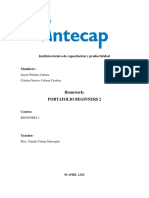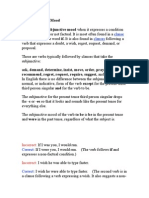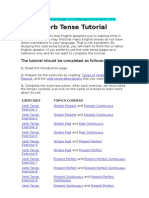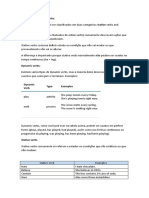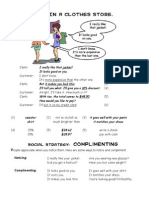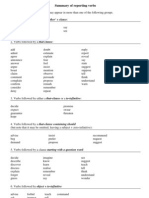Subjuntivo en Ingles
Subjuntivo en Ingles
Uploaded by
rosamar3366Copyright:
Available Formats
Subjuntivo en Ingles
Subjuntivo en Ingles
Uploaded by
rosamar3366Original Title
Copyright
Available Formats
Share this document
Did you find this document useful?
Is this content inappropriate?
Copyright:
Available Formats
Subjuntivo en Ingles
Subjuntivo en Ingles
Uploaded by
rosamar3366Copyright:
Available Formats
http://www.bbc.co.uk/worldservice/learningenglish/grammar/learnit/learnitv105.shtml http://www.english-at-home.com/grammar/using-the-subjunctive-form-in-english/ http://www.ego4u.
com/en/cram-up/grammar/subjunctive
SUBJUNCTIVE
The subjunctive is used to express intention or proposal about the future. It requires use of the verb in its basic form rather than its normal tense form. We dont use the subjunctive very much in contemporary English unless we wish to sound very formal. With verbs like suggest, recommend, insist and adjectives like important, essential, imperative, crucial, vital, we often use should + infinitive instead of the subjunctive or we can use the normal tense form. The reporting verbs and adjectives above are normally followed by a that-clause in which that itself is often omitted. In your example, Olly, Its important that the lesson be funny sounds too formal. We would normally say: Its important that the lesson should be funny. Compare also the following: The doctor recommended (that) he should give up smoking. The doctor recommended (that) he give up smoking. (More formal) The doctor recommended (that) he gives up smoking. (Less formal)
It + be + adjective: desirable/important/essential/imperative/vital/etc In all of these examples below with should, you can substitute the subjunctive if you want to make it sound more formal or the present simple tense if you want it to be less formal: It is essential (that) you should be given your medication by a properly qualified nurse. (Or: be given, or are given.) For the future well-being of the company, it is imperative (that) he should resign now. (Or: resign, or resigns.) It is desirable (that) he should be retained in custody, rather than released on bail. (Or: be retained, or is retained.)
It is vital (that) he should receive some treatment (or receive, or receives) whether he be (or is) innocent or guilty of this particular crime.
suggest/recommend/insist/demand Similarly with these reporting verbs, we can use should, the subjunctive or the normal tense in the that-clause, depending on whether it is appropriate to sound formal or not: The government tried to insist (that) all firearms should be handed in without delay. (Or: be handed in, or are handed in.) The doctors have recommended (that) he should remain in hospital for a further three weeks. (Or: remain, or remains.) I suggested he should leave right now. (Or: leave, or leaves.)
advise/ask/command/instruct/request/require/warn Note that these reporting verbs do not require should or a thatclause and are normally used instead with a simple infinitive. The issue of whether to use the subjunctive or not with these verbs does not then arise. Consider the following: Her mother advised them to be home by ten o clock. They required me to clean the house every Saturday. You asked me to let you know how much it would cost. I warned him not to swim where there were dangerous currents.
Were is also a kind of subjunctive when it is used with I and he/she/it instead of was with wish and in if-clauses. If we use the more natural was, it will sound more informal. Consider the following: I wish I were (or was) home now. I wish it were (or was) the weekend. If I were (or was) you, Id get in touch with Veronika before she leaves for Australia If I were (or was) still living with John, Id be much better off, but I wouldnt be so independent.
fixed expressions with the subjunctive
There are a number of fixed expressions which require the subjunctive, including: Bless you. (Which means: May God bless you.) Long live our gracious Queen. (The first line of the British National Anthem) A toast now: long live the bride and groom. I have always supported you financially, but be that as it may, I can no longer support your current lifestyle. If I have to pretend that you no longer exist, so be it. Be that as it may means whether that is the case or not So be it means nothing can or will be done to change that .
http://curso-gratis-ingles.euroresidentes.com/2011/03/ingles-subjuntivo.html
Ingls subjuntivo
El subjuntivo en ingls se usa despus de algunos verbos y en algunas expresiones fijas. Se usa en situaciones formales. Se forma con el infinitivo sin to. No se usa la tercera persona (el verbo con s) o el verbo en pasado. Ejemplo: I demanded that he arrive on time. (NOT I demanded that he arrives on time) Se forma el negativo en el subjuntivo con not + infinitivo sin to Ejemplo: I suggested that he not get offended by what she said. Se usa el subjuntivo con los siguientes verbos: demand, insist, suggest, require, Se usa con estas expresiones: Its important that Its essential that Its necessary that It is best that It is crucial that It is imperative that It is urgent that It is vital that It is a good idea that Ejemplo: Its essential that you learn this list of verbs. Se usa con algunas expresiones fijas: God save the Queen.
Be that as it may Come what may A veces se usa should con el subjuntivo en ingls. Ejemplos: I recommended that he should buy a new television. I suggested that he should be punctual for the class. Ejercicio: Algunas de las siguientes frases tienen errores. Corregir las que tienen errores y despus haga clic aqu para ver las respuestas de Ingls Subjuntivo. Ojo! Algunas frases son correctas. 1. I insist that you not to tell her. 2. Its a good idea that he goes at once. 3. Its crucial that we get to the station on time. 4. I recommend that he tries that method of learning. 5. Its urgent that I see the manager immediately. 6. He suggested that she visit the art gallery. 7. I recommend that you read the instructions carefully. 8. Its important that he speak to her today. 9. He demanded that we to pay for the broken plate. 10. I insisted that he does the homework tonight.
You might also like
- 500 Really Useful English Phrases: From Intermediate to AdvancedFrom Everand500 Really Useful English Phrases: From Intermediate to AdvancedRating: 5 out of 5 stars5/5 (3)
- Palestinian and Jordanian Verb FormsDocument27 pagesPalestinian and Jordanian Verb FormsAdrian Bai100% (4)
- LIT17 - ANC - G10U5 - SouthA - LD - RP 11Document2 pagesLIT17 - ANC - G10U5 - SouthA - LD - RP 11alanoudalmulhimsgsNo ratings yet
- Adding Emphasis in EnglishDocument2 pagesAdding Emphasis in EnglishtoptenacademyNo ratings yet
- TOEIC Grammar Guide: 22 Grammar Rules You Must Know To Pass The TOEIC Exam!From EverandTOEIC Grammar Guide: 22 Grammar Rules You Must Know To Pass The TOEIC Exam!Rating: 3.5 out of 5 stars3.5/5 (15)
- Inglés - Secundaria Tema 16 The Expression of PossessionDocument7 pagesInglés - Secundaria Tema 16 The Expression of PossessionMARIA BLANCONo ratings yet
- SubjunctiveDocument21 pagesSubjunctiveDeborah AmeliaNo ratings yet
- The Subjunctive: Olly Jezek From The Czech Republic WritesDocument4 pagesThe Subjunctive: Olly Jezek From The Czech Republic WritesDesriza Happy HamzahNo ratings yet
- English GrammarDocument194 pagesEnglish Grammarnaji Choukri100% (1)
- All About Simple PresentDocument6 pagesAll About Simple PresentShameerNo ratings yet
- Grammar: The Subjunctive. Where and What Is It?Document2 pagesGrammar: The Subjunctive. Where and What Is It?Mary DanielNo ratings yet
- SubjuntiveDocument3 pagesSubjuntivepablovela97No ratings yet
- c1 IngleseDocument21 pagesc1 IngleseArab NoreddineNo ratings yet
- Present Continuous FormsDocument3 pagesPresent Continuous FormsMircea MeriacriNo ratings yet
- Phrasal Verbs Relating To Illness: Come Down With Go Down With Pick Up Going Around/roundDocument5 pagesPhrasal Verbs Relating To Illness: Come Down With Go Down With Pick Up Going Around/roundChoy Kok WaiNo ratings yet
- Present Continuous FormsDocument3 pagesPresent Continuous FormsAdina100% (1)
- UntitledDocument14 pagesUntitledAULINO JÚLIONo ratings yet
- Aula 7 - Present ContinuousDocument13 pagesAula 7 - Present ContinuousmarcusbmonteiroNo ratings yet
- Simple Present and ContinousDocument6 pagesSimple Present and ContinousVanja GrujicNo ratings yet
- The Ultimate Beginners Guide PDFDocument6 pagesThe Ultimate Beginners Guide PDFPluto The DogNo ratings yet
- LESSON 67 Perfect Tenses and Continuous TensesDocument19 pagesLESSON 67 Perfect Tenses and Continuous Tensesserneuneves7No ratings yet
- Conjunction SDocument10 pagesConjunction SviddusagarNo ratings yet
- Verb Tense TutorialDocument59 pagesVerb Tense TutorialfarrukhnrlNo ratings yet
- Subjunctive MoodDocument7 pagesSubjunctive Moodtheseductivecharacter100% (1)
- What Is The Present Perfect TenseDocument6 pagesWhat Is The Present Perfect TenseGareth JoseNo ratings yet
- Avoiding Common Error With VerbsDocument4 pagesAvoiding Common Error With VerbsAjlia AzamNo ratings yet
- English 1Document14 pagesEnglish 1Musaber HNo ratings yet
- Present SimpleDocument116 pagesPresent Simplekpmadhun100% (1)
- Inversion and EmphasisDocument1 pageInversion and EmphasisEstherNo ratings yet
- Resumen Clases ActividadDocument25 pagesResumen Clases ActividadCARLOS DIAZNo ratings yet
- Are You Watching TV?: Complete List of Present Continuous FormsDocument3 pagesAre You Watching TV?: Complete List of Present Continuous FormsCaciula IvanNo ratings yet
- Present Perfect GrammarDocument5 pagesPresent Perfect GrammarGabriel ValleNo ratings yet
- What Is An Imperative SentenceDocument24 pagesWhat Is An Imperative SentenceNovy LestariNo ratings yet
- What Are Modal Auxiliary VerbsDocument8 pagesWhat Are Modal Auxiliary VerbshaileyesusNo ratings yet
- Present ContinuousDocument3 pagesPresent ContinuousILy SofiaNo ratings yet
- Grammar Giving AdviceDocument10 pagesGrammar Giving AdviceTofik MohammedNo ratings yet
- Portafolio Beginners 2 Cristian y NayeliDocument18 pagesPortafolio Beginners 2 Cristian y NayeliCristian CabreraNo ratings yet
- Verbs TensesDocument32 pagesVerbs TensesLucas Padrão100% (1)
- Present Simple Vs Present ContinuousDocument8 pagesPresent Simple Vs Present Continuousmzt messNo ratings yet
- Tugas Summary 1-11Document17 pagesTugas Summary 1-11sherinaNo ratings yet
- SentenceDocument12 pagesSentenceSumera BokhariNo ratings yet
- Negative and Limiting AdverbialsDocument12 pagesNegative and Limiting AdverbialsDanny J. Pinto-GuerraNo ratings yet
- Reported SpeechDocument11 pagesReported SpeechlilydevilNo ratings yet
- ShouldDocument11 pagesShouldaprilnemesis04No ratings yet
- Functions Paper Ratio: 10 To 30 % Unit 1: Asking and Answering QuestionsDocument16 pagesFunctions Paper Ratio: 10 To 30 % Unit 1: Asking and Answering QuestionsMemoona MunzarNo ratings yet
- She Asked Them Where Was The StationDocument3 pagesShe Asked Them Where Was The StationartselNo ratings yet
- The Subjunctive MoodDocument25 pagesThe Subjunctive Moodjoharababcock23No ratings yet
- Verb Tense Tutorial: Complete List of Simple Present FormsDocument43 pagesVerb Tense Tutorial: Complete List of Simple Present FormsRoxana TudoseNo ratings yet
- Full Tenses PDFDocument40 pagesFull Tenses PDFsarief100% (2)
- Present SubjunctiveDocument28 pagesPresent SubjunctiveVusala HasanovaNo ratings yet
- The Subjunctive MoodDocument5 pagesThe Subjunctive Moodaphythyon100% (1)
- Inversion and EmphasisDocument14 pagesInversion and EmphasisAleNo ratings yet
- 3B - 074 - Septi Dimas Jamaludin - 3 - MODULEDocument11 pages3B - 074 - Septi Dimas Jamaludin - 3 - MODULEGanryuNo ratings yet
- Verb Tense TutorialDocument51 pagesVerb Tense TutorialEllen Molina100% (1)
- Active / Passive Verb FormsDocument37 pagesActive / Passive Verb FormshusnaNo ratings yet
- Trabalho de InglesDocument18 pagesTrabalho de InglesSabio Maria JulioNo ratings yet
- Level IV - VerbsDocument8 pagesLevel IV - VerbsRodrigo ZuzaNo ratings yet
- Summary Week 7 Nnandaryani D 058 MANAGEMENT BDocument11 pagesSummary Week 7 Nnandaryani D 058 MANAGEMENT BCukup DyanNo ratings yet
- The Grammar GameshowDocument29 pagesThe Grammar GameshowOkan Taşin100% (1)
- Negative and Limiting Adverbials 2Document12 pagesNegative and Limiting Adverbials 2Sattar Hussain100% (1)
- Present Perfect Simple/present Perfect Progressive/modal VerbsDocument24 pagesPresent Perfect Simple/present Perfect Progressive/modal VerbsCindy Lizeth Valle SalasNo ratings yet
- Matriz, 12 EnglishDocument10 pagesMatriz, 12 Englishricardomoiambo07No ratings yet
- Inglés Gramática (Perspective)Document15 pagesInglés Gramática (Perspective)Amanda PascualNo ratings yet
- Attribute Grammar Example 2Document2 pagesAttribute Grammar Example 2rosamar3366No ratings yet
- Present Perfect With Alreadyjustyeteverneverforsin - 24180Document2 pagesPresent Perfect With Alreadyjustyeteverneverforsin - 24180rosamar336625% (4)
- From Northanger Abbey To Sanditon: Austen's Views On Educational Matters ComparedDocument34 pagesFrom Northanger Abbey To Sanditon: Austen's Views On Educational Matters Comparedrosamar3366No ratings yet
- Level Test Nivel II Final-1Document1 pageLevel Test Nivel II Final-1rosamar3366No ratings yet
- English Exam: Night Morning Evening AfternoonDocument4 pagesEnglish Exam: Night Morning Evening Afternoonrosamar3366100% (1)
- ShoppingsurveyDocument3 pagesShoppingsurveyrosamar3366No ratings yet
- Vigesimoquinto Test de Ingles: Passive. Change The Sentences To PassiveDocument1 pageVigesimoquinto Test de Ingles: Passive. Change The Sentences To Passiverosamar3366No ratings yet
- Vigesimotercer Test de Ingles: In, At, On, To, During, BeforeDocument1 pageVigesimotercer Test de Ingles: In, At, On, To, During, Beforerosamar3366No ratings yet
- Ex Inicial 1ºesoDocument5 pagesEx Inicial 1ºesorosamar3366No ratings yet
- Level Test 4º ESODocument2 pagesLevel Test 4º ESOrosamar3366No ratings yet
- Simulacro para Inglés-1º de ESO. Nivel Medio: VocabularyDocument3 pagesSimulacro para Inglés-1º de ESO. Nivel Medio: Vocabularyrosamar3366No ratings yet
- Decimoquinto Test de Ingles:: Which, Whom, What, That..Document1 pageDecimoquinto Test de Ingles:: Which, Whom, What, That..rosamar3366No ratings yet
- 3º Primaria - Adv.fecuenciaDocument2 pages3º Primaria - Adv.fecuenciarosamar3366No ratings yet
- As Like - Do EmphasisDocument4 pagesAs Like - Do Emphasisrosamar3366No ratings yet
- Gerunds and InfinitivesDocument5 pagesGerunds and Infinitivesrosamar3366No ratings yet
- Summary of Reporting VerbsDocument2 pagesSummary of Reporting Verbsrosamar3366No ratings yet
- Expressions For Comparing Two Objects: Er Than Er Than More Than More Than Not As As Not As AsDocument3 pagesExpressions For Comparing Two Objects: Er Than Er Than More Than More Than Not As As Not As Asrosamar3366No ratings yet
- Exerc - Passive Voice - AnswersDocument3 pagesExerc - Passive Voice - Answersrosamar3366No ratings yet
- VERBS All ExercisesDocument5 pagesVERBS All Exercisesrosamar3366No ratings yet
- UNIT 4: THE TUDOR AGE (1485 - 1602) : 4.1. The Tudors and The ChurchDocument4 pagesUNIT 4: THE TUDOR AGE (1485 - 1602) : 4.1. The Tudors and The Churchrosamar3366No ratings yet
- Library: Transcriber's NoteDocument122 pagesLibrary: Transcriber's NoteGutenberg.org100% (3)
- Katamba PDFDocument13 pagesKatamba PDFAbdi Nassor0% (1)
- Errors in English Among Arabic SpeakerDocument4 pagesErrors in English Among Arabic Speakermokta700rNo ratings yet
- Dative PrepositionsDocument2 pagesDative PrepositionsMMRNo ratings yet
- A Practical Handbook of The Chin Language Part I & Part IIDocument31 pagesA Practical Handbook of The Chin Language Part I & Part IIzamkhual50% (2)
- Devanagari AlphabetDocument68 pagesDevanagari Alphabetေအာင္ခန္႔ န.ပ.သ မန္းNo ratings yet
- A Brief English Grammar 1000006181 PDFDocument203 pagesA Brief English Grammar 1000006181 PDFMohammad Waseem100% (1)
- Determiners in EnglishDocument27 pagesDeterminers in EnglishSajadAbdaliNo ratings yet
- There To Be PDFDocument2 pagesThere To Be PDFDavide AmaralNo ratings yet
- Personal PronounsDocument5 pagesPersonal PronounsRoz NicNo ratings yet
- Atg Quiz Partsofspeech PDFDocument2 pagesAtg Quiz Partsofspeech PDFmathclubNo ratings yet
- Verbes PronominauxDocument3 pagesVerbes Pronominaux111961No ratings yet
- Unit1-Preparing To WriteDocument32 pagesUnit1-Preparing To Write投資路人甲No ratings yet
- Eating Tiger. As The Adjectives Are Hyphenated, It Is Clear That They Describe The Noun, 'Tiger'. Now, Consider TheDocument2 pagesEating Tiger. As The Adjectives Are Hyphenated, It Is Clear That They Describe The Noun, 'Tiger'. Now, Consider TheacroaliNo ratings yet
- AnalysisDocument3 pagesAnalysismelixburecNo ratings yet
- Word Formation ChartDocument6 pagesWord Formation ChartelizabethbennetNo ratings yet
- 7 C S of CommunicationDocument26 pages7 C S of CommunicationRaja ArsalanNo ratings yet
- ArticlesDocument4 pagesArticlesDm MrkNo ratings yet
- Down Came Up Into The AirDocument2 pagesDown Came Up Into The AirAnonymous AcyayNxSNo ratings yet
- Language History and ChangeDocument4 pagesLanguage History and ChangeStasia FilipNo ratings yet
- Pref - 4 - GRAMMAR 2.4 - Revisión Del Intento 100 de 100Document4 pagesPref - 4 - GRAMMAR 2.4 - Revisión Del Intento 100 de 100Juan M. Suarez ArevaloNo ratings yet
- The Problem of Classification of Phrase and Word-Formation (Derivation) in Modern Chinese Language Is AnalyzedDocument4 pagesThe Problem of Classification of Phrase and Word-Formation (Derivation) in Modern Chinese Language Is AnalyzedHerbie43No ratings yet
- Preposition of PlaceDocument2 pagesPreposition of PlaceBrannNo ratings yet
- Nouns in French JSS2Document3 pagesNouns in French JSS2gloriaehibhasuameNo ratings yet
- جامعة الموصل التصغير بين اللغتين العربية والانكليزيةDocument19 pagesجامعة الموصل التصغير بين اللغتين العربية والانكليزيةMaster AlazawyNo ratings yet
- Passive Voice For Imperative Sentences - RulesDocument2 pagesPassive Voice For Imperative Sentences - Rulesjulio100% (2)
- English Grammar For SSC CGL ExamDocument41 pagesEnglish Grammar For SSC CGL ExamAvnit Chaudhary71% (7)




































